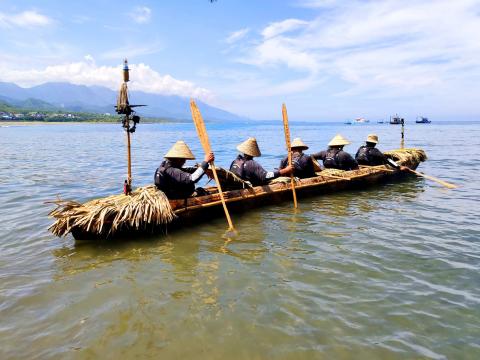A team of Taiwanese and Japanese researchers yesterday launched a dugout canoe from Taitung County to test the hypothesis that the early inhabitants of Japan traveled from Taiwan to the Ryukyu Islands via the Kuroshio Current using similar wooden vessels about 30,000 years ago.
The team constructed the cedar canoe using stone tools to replicate canoe-building methods that were likely used by prehistoric seafarers, National Museum of Prehistory assistant researcher Agilasay Pakawyan said, adding that the five crew members would navigate using the stars to stay true to ancient navigation techniques.
The distance between Cape Wushibi (烏石鼻) in Taitung to the coast of Yonaguni, one of the Yaeyama Islands, is 205km when traveled in a straight line, he said.

Photo: CNA
The voyage is estimated to take 1.6 to 2.8 days, assuming favorable winds and the canoe staying on course, Agilasay said.
Theoretically, a canoe could complete the journey in anything from 30 hours to 30 days, he added.
The research being conducted by the museum and Yousuke Kaifu of Japan’s National Museum of Nature and Science began in 2017 and four of the crew members are Japanese, he said.
An experiment conducted two years ago showed that bamboo rafts are not sturdy enough to survive the voyage, Agilasay said.
The launch was originally scheduled for Sunday last week, but it was postponed due to bad weather.
Foamy sea conditions early yesterday raised concerns over another delay, but the canoe set out without incident at 1:40pm.
Coast guard patrol boats and drones are accompanying the canoe on its voyage.

DAREDEVIL: Honnold said it had always been a dream of his to climb Taipei 101, while a Netflix producer said the skyscraper was ‘a real icon of this country’ US climber Alex Honnold yesterday took on Taiwan’s tallest building, becoming the first person to scale Taipei 101 without a rope, harness or safety net. Hundreds of spectators gathered at the base of the 101-story skyscraper to watch Honnold, 40, embark on his daredevil feat, which was also broadcast live on Netflix. Dressed in a red T-shirt and yellow custom-made climbing shoes, Honnold swiftly moved up the southeast face of the glass and steel building. At one point, he stepped onto a platform midway up to wave down at fans and onlookers who were taking photos. People watching from inside

A Vietnamese migrant worker yesterday won NT$12 million (US$379,627) on a Lunar New Year scratch card in Kaohsiung as part of Taiwan Lottery Co’s (台灣彩券) “NT$12 Million Grand Fortune” (1200萬大吉利) game. The man was the first top-prize winner of the new game launched on Jan. 6 to mark the Lunar New Year. Three Vietnamese migrant workers visited a Taiwan Lottery shop on Xinyue Street in Kaohsiung’s Gangshan District (崗山), a store representative said. The player bought multiple tickets and, after winning nothing, held the final lottery ticket in one hand and rubbed the store’s statue of the Maitreya Buddha’s belly with the other,

‘NATO-PLUS’: ‘Our strategic partners in the Indo-Pacific are facing increasing aggression by the Chinese Communist Party,’ US Representative Rob Wittman said The US House of Representatives on Monday released its version of the Consolidated Appropriations Act, which includes US$1.15 billion to support security cooperation with Taiwan. The omnibus act, covering US$1.2 trillion of spending, allocates US$1 billion for the Taiwan Security Cooperation Initiative, as well as US$150 million for the replacement of defense articles and reimbursement of defense services provided to Taiwan. The fund allocations were based on the US National Defense Authorization Act for fiscal 2026 that was passed by the US Congress last month and authorized up to US$1 billion to the US Defense Security Cooperation Agency in support of the

‘COMMITTED TO DETERRENCE’: Washington would stand by its allies, but it can only help as much as countries help themselves, Raymond Greene said The US is committed to deterrence in the first island chain, but it should not bear the burden alone, as “freedom is not free,” American Institute in Taiwan Director Raymond Greene said in a speech at the Institute for National Defense and Security Research’s “Strengthening Resilience: Defense as the Engine of Development” seminar in Taipei yesterday. In the speech, titled “Investing Together and a Secure and Prosperous Future,” Greene highlighted the contributions of US President Donald Trump’s administration to Taiwan’s defense efforts, including the establishment of supply chains for drones and autonomous systems, offers of security assistance and the expansion of